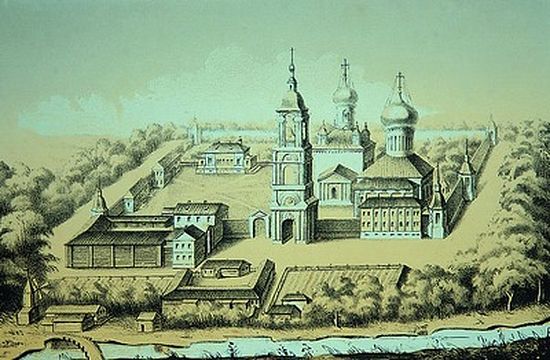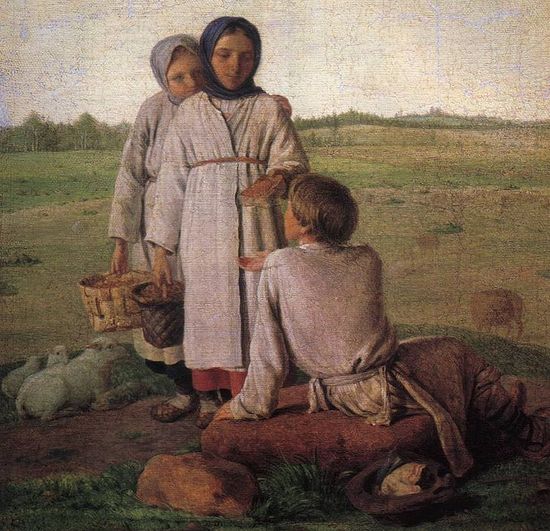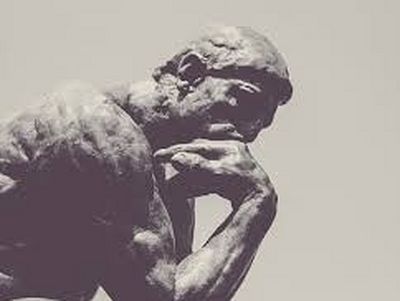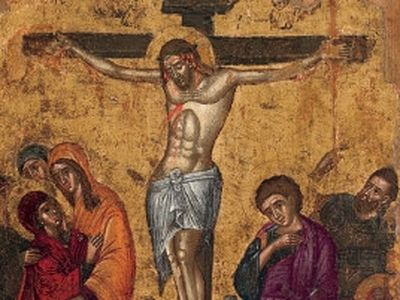Whom we commemorate on February 7/20
In the village of Vyezdna Sloboda in the Nizhegorod province, Arzamazsk district a son Michael was born to the peasant Makary Gregoriev Rastorguev and his wife Evdokia in 1827. From his very birth the child appeared extremely frail and sickly. His eyes were closed and constantly discharged. His arms were very thin and showed hardly any sign of movement. During the second year after his birth ulcers appeared over almost his entire body, at which time the child opened his eyes but also because of the ulcers began to suffer unbearably and cried day and night.
At this time in the Arzamazsk Alexeiev monastery an eldress by the name of Elena was struggling in monasticism. Evdokia visited her with her ailing son Michael. She was sad in heart over the illnesses of her dearest child and hoped to receive help and comfort from Elena. This is what Evdokia reported:
"When I brought my Mishenka to matushka Elena Afanasevna there were many visitors in her cell, all of them society women. As soon as I passed over the threshold of the cell matushka stood up, came to me and took my child up in her arms. He cried and groaned loudly. She gazed at him for a long time and seemed like she admired him. The she began to quickly carry him up to every visitor exclaiming; ‘just look what a dear child!’ When matushka came to me I gave her a token, a little kerchief I had made. She accepted it, twisted it up in her hands and cast it in Mishenka's face. He immediately became still and stopped crying. Now she said, 'Go and take him to Communion, then come back to me.' I fulfilled her order and during the entire liturgy the child was completely still. After the liturgy I again went to matushka's cell and found her surrounded by guests. Like the first time she took Mishenka up in her arms and began to take him around to the guests with the same words and finally placed him on the table. On the table lay a few particle of antidor, which she frequently sorted and moved around. Having chosen a few of these particles she gave them to me. I stretched out my hand to accept this gift but matushka would not give it to me. She brought them to me again but when I wanted to accept them she refused to give them. This she did three times. Already on the third time when I already would not reach, Elena Afanasevna said, `Do you know what this is? Indeed this is treasure form the Great Martyr Barbara. Take it and soak it in three-year-old Theophany water and give it to your infant. But you be careful, protect him and look after him zealously for the grace of God is on him.' The last instruction matushka repeated several times and sent me on my way home."
 The Arzamazsk Alexeiev monastery
The Arzamazsk Alexeiev monastery
Michael's mother fulfilled this order and from that time on the child became more peaceful. However the illness did not go away, the ulcers did not heal and on his back and chest two humps appeared. His entire body developed incorrectly. His hands and feet were thin and wasted. The child could not stand up or sit. He was rocked in a cradle till he was seventeen. His mother never left his side and looked after him with an uncommon zeal. When he turned seventeen the ulcers healed but his legs cramped up against his back and with his hands he could barely make the sign of the cross. But despite the terribly cruel physical sufferings the child's spiritual capabilities developed normally. He possessed a bright mind, a prayerful disposition and quiet tender love for everyone. His mother even noticed that he was clairvoyant and began to take his advice.
Once Michael's father traveled to the fair in Nizhegorod to trade, carrying a considerable amount of money. The fair was drawing to a close; neighbors were returning with their profits, and the family was awaiting the head of the house with hopes for good returns. One day the sick one called his mother and said to her, "Matushka what are you waiting for, what are you expecting? There is already no money, in fact does our father even have a dime?" Frightened, Evdokia immediately left for Nizhny. Along the way people from her village met her and told her that her husband was robbed. A search was made but without a result. Right there people told her to go to a certain Martha with the problem of the robbers. Martha lived in Nizhny at Nikola on the Griady and was considered blessed. She came to her and saw that in the poor cell an aged woman in chains was standing in prayer. Not allowing her to say anything, the woman placed her chains and cap on Evdokia and said, "O slave of God Evdokia, this week you celebrate your name's day (this took place around the first of August, as the fouth is the day of the nun martyr Evdokia). What sorrow you have! Pity! Pity! Well, your money is in the hands of people close to you but you do not have a blessing to take them to court. Do not do that, better go and comfort your husband, for he is a poor soul and might despair and do something to himself, then his soul will perish. Why are you so sad? For you have a priceless treasure, your Mishenka, a blessed youth, protect him, look after him with care!" This is what she said despite the fact that Evdokia said not a word about the lost money or the ailing son.
Soon after the Rastorguevs business recovered and things improved.
From this time onwards news of Michael's clairvoyance begin to spread through the region. People of all backgrounds and social standing came, some for advice and instruction, others for comfort and help in their misfortunes. Everywhere he was known as blessed Mishenka, which everyone who knew him called him till his repose. He did not receive everyone the same way. Some he received with a kind of childlike joy, which manifested itself long before the person's arrival. Those who visited him he instructed to read spiritual books, canons, akathists and to sing Church hymns, which he later learned and sang in seclusion. Among these hymns he especially liked to sing the irmosi of Holy Pascha. Sometimes he manifested special gifts. For example the story of G:
"I loved to frequently converse with the sick one and once heard him foretell the death of my wife. I was extremely saddened by this news and began even more often to visit Mishenka, who in between talks would make me read and sing. Once during a reading he began to give me a directive, which seemed to be impossible to fulfill. 'What are you thinking about?' he asked. Before I could answer he told me to hand him the New Testament in Russian, which I brought with me. He turned a few pages of the Holy Writ and pointed with his finger at one text, ordering me to read it. The text indicated concerned my thoughts and resolved what was upsetting me. Keep in mind that the ailing Michael could not read or write and never went to school."
Here is yet another incident. One peasant from the village of Panov (in the Arzamarzk district) who was a contractor for the construction of stone buildings suddenly lost his mind. His relatives attributed his misfortune to the curses of jealous associates. As is the custom among simple folk they unfortunately turned to witch doctors and fortune tellers and received no relief from them. The old man, the father of the sick person, was at a loss. Once while in his sorrowful state he saw a monk in a dream who ordered him to take his sick son to the Vyezdnaia Sloboda, to the boy Michael. He immediately fulfilled this command. When the sick man was brought to suffering Michael he right away strictly reprimanded his father and relatives for turning to sorcerers and quacks. By doing that he told them they had only brought more harm to the sick man and spiritually ruined themselves. He then gave them Holy Theophany water, which he ordered them to give the sick man for six weeks and to daily commemorate the sufferer during that time in nine churches at Liturgy. They fulfilled all of this exactly and at the end of this period the sick peasant was cured and came to thank suffering Michael for the good advice.
Michael's life passed quietly. He conversed with visitors, sang when he was alone. His physical sufferings were never alleviated. He suffered from asthma and rheumatic pains throughout his whole body. Several times a year he confessed and received Communion and was always at peace. He even showed anger when people brought to his attention his sufferings.
This amazing boy Michael reposed peacefully in 1859. On the very day of his repose they called for the priest Fr. Nicholas Sakharov to come and serve the mystery of Holy Unction over him. When the priest asked why they did not request him to administer Holy Communion, they answered that Michael was suffering from vomiting. Having administered the Mysteries the priest told them to immediately summon him when the boy stopped vomiting. At 12:00 midnight they ran for the priest. When he entered the house the sick one clearly expressed the desire to confess and commune, which was done immediately. Then at the boy's request the priest read the canon to the Mother of God for the departure of the soul, and taking leave of the dying youth the priest left. Within five minutes after his departure Michael loudly pronounced the words of Righteous Symeon, Lord now lettest Thy servant depart in peace, but before he could finish the verse he gave up his spirit.
Translated from: Zhizneopisaniia Otechestvennykh Podviznikov Blagocheiia 18 i 19 vekov, Fevral'. Moskva: lzdanie Afonskago Russkago Panteleimonova Monastyria, 1906, 85-90.
Orthodox Life vol. 59, no. 1, Jan-Feb 2008, pp. 24-27.




